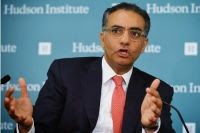| Online: | |
| Visits: | |
| Stories: |

| Story Views | |
| Now: | |
| Last Hour: | |
| Last 24 Hours: | |
| Total: | |
States and corporations grab for reins of the Internet
TECHNOLOGY OCT. 11, 2014 – 06:45AM JST ( 2 )
States and corporations grab for reins of the Internet
ICANN President Fadi Chehadé speaks at the Hudson Institute on April 4, 2014. The group has moved to center stage
AFP
SAN FRANCISCO —
As the U.S. steps back from overseeing the group entrusted to essentially run the Internet, states and corporations are grabbing for the reins.
The Internet Corporation for Assigned Names and Numbers (ICANN) has gone from being behind the scenes tending to the task of managing website addresses to being center stage in a play for power on the Internet.
“Governments want to exert control over the sweeping trans-national power of the Internet that is effecting their policies, politics, social fabric and/or their economic conditions,” ICANN chief executive Fadi Chehade told AFP just days before the group gathers in Los Angeles beginning Sunday to tackle an array of hot issues.
“The other groups are large corporations concerned about security issues,” he continued while discussing forces striving for influence over the organization.
“Therefore, they are stepping in with force to figure out how to reduce potential harm to customers and to their businesses.”
Governance of the Internet will be a high-profile topic at the ICANN 51 meeting that will continue through October 16 in Los Angeles.
The World Economic Forum recently unveiled a project aimed at connecting governments, businesses, academia, technicians and civil society worldwide to brainstorm the best ways to govern the Internet. [it was designed to not be governed, it was designed for freedom... -AK]
WEF launched its NETmundial Initiative in a bid to build on the outcome of a large conference in Brazil in April that called for a transparent, multi-stakeholder approach to running the Web.
“Anyone who wants to come in and build a coalition of stakeholders and address issues, more power to them,” Chehade said of the crowd-sourcing move.
“The way we put it in ICANN is getting the free will of the people to bottom-up coalesce, work together and come up with solutions.”
Participants at the conference in Brazil balked at a push by some countries, including China and Russia, for governments to move into a leading role in overseeing the Internet, amid fears of the impact this could have on the unity of the Web and on online dissent and freedom of expression. [...what those bastions of free-speech want control? Nah... LOL!!! -AK]
Chehade told AFP that the WEF will be involved in a more action-oriented initiative to be announced shortly.
“We don’t need more dialogue, we need more solutions,” Chehade said.
[Quotation below has been inserted by me -AK]
“….It is not difficult to understand why the NMI is controversial. There are four distinct causes. First, it appropriated the name of the Brazilian Netmundial meeting and its respected outcome document, even though there is no formal relationship and very little continuity between the WEF crowd (other than Fadi himself) and the actors and institutional methods of the Brazilian Netmundial meeting. For that reason, I like to refer to NMI as the “Not-Mundial.” Just to be clear.Second, it was formed through a top-down process. Fadi and his allies in WEF hand-picked people from governments, business and civil society to be insiders in the process, instead of forming an open institution. While top-down initiatives are sometimes unavoidable to bootstrap a process, Fadi has relied far too heavily on such methods. The man simply does not understand (or does not like?) open, bottom up processes, perhaps because they cannot be controlled. Last year he created no less than 5 “Strategy Panels” in which groups of luminaries selected by him and reporting only to him were supposed to address some of the long-term issues affecting the future of ICANN and Internet governance. Millions of dollars were spent, but none of them produced anything that had any traction in the broader community. It was the 5th Strategy Panel, on Global Internet Cooperation and Governance Mechanisms led by Toomas Ilves of Estonia and Google’s Vint Cerf, that forged the link to the World Economic Forum. WEF, along with ICANN and the Annenberg Foundation, co-convened that panel. So Fadi has been targeting the use of WEF as a platform of an Internet governance initiative for some time. Surprisingly to him, however, and predictably to the rest of us, the Ilves/Cerf report, produced by a cozy group of insiders, was totally eclipsed by the more open and inclusive Netmundial process, which was not afraid to deal with contending views.
This method of trying to “lead” has a number of known pathologies when used in public global governance contexts. It inevitably results in the selection of people based on their socio-economic proximity to the people doing the selections. Inevitably, it makes others resentful of the fact that they weren’t selected. Communities can be divided and conquered based on their selection or inclusion. And obviously, the selections reflect and reinforce the political biases of those making the choices. True to form, the Not-Mundial is run by a very predictable and usual-suspecty cast of characters, although the absence of Google and other major edge-Internet firms is a surprise. The few privileged civil society organizations included in early Not-Mundial preparations were pleased to be insiders at first, but have since backpedaled, issuing statements criticizing the initiative’s lack of inclusiveness lest they be seen as co-opted – which of course never, ever happens. See also the comments of APC.
Third, the Not-Mundial’s link to the elite WEF, which is built around an annual meeting for a few “world leaders” in Davos, Switzerland, raises the spectre of domination of the “ecosystem” by business and political elites. This too is a legitimate concern, although there is a bit of a Catch-22 here. You can’t have a “multistakeholder” governance system without involving and representing business actors, especially those who operate networks and Internet services. On the other hand there is always a noisy lefty faction among states and civil society who think that any business is per se illegitimate, and any sign of their presence is an indication that the whole system is corrupt.[1] If the purpose of Not-Mundial was to strengthen corporate engagement in good faith governance negotiations with other stakeholder groups it would be good, but the Not-Mundial we have threatens to elevate and isolate the “leaders” from the rest of us.”
The ICANN 51 agenda that includes tackling whether identities of those running websites should be public or whether privacy should be safeguarded and operators true names revealed only with proper court orders.
ICANN runs a Whois.icann.org service where contact information can be found regarding registered operators of specific websites but not necessarily people behind business names.
“It was designed by engineers as a technical tool to contact servers,” Chehade said of Whois.
“Now, it is becoming a directory of a billion websites; it was not designed for that.”
ICANN has mapped a path to evolve Whois into a true global website directory, complete with privacy safeguards for website operators, according to the chief executive.
Chehade felt that ICANN has a good grip on the technical challenges it faces but “we have some holes” in non-technical issues such as privacy, cyber security, intellectual property rights, taxation and more.
“All these non-technical issues that occur in the space of the use of the Internet, rather than the system that runs the Internet, require global frameworks of cooperation to address,” Chehade said. “In general, these solutions are not yet forthcoming.”
ICANN is also being pushed beyond its scope, being asked to tackle cyber security and bad behavior by website operators.
Essentially, issues beyond protecting and managing the “root” of the domain name system are outside ICANN’s claimed territory.
“It is happening, and we are resisting it,” Chehade said.
He compared the situation to a customer being treated horribly by a car service opting to take their complaint to the department of motor vehicles that issued the driver a license.
What makes it frustrating turning away people with legitimate complaints about websites is there tends to be no where to send them for help, he noted.
“As we move forward, ICANN and others may have roles in an eco-system of cooperation that may involve multiple parties to address bad behavior,” Chehade said.
Critics of ICANN have included France, which branded the US-based body unfit for Internet governance.
The eurozone’s second-largest economy has been at war with the body, which assigns domain names like ‘.com’ and runs crucial internet infrastructure, over the ‘.wine’ and ‘.vin’ suffixes being rolled out as part of an unprecedented expansion of domains.
© 2014 AFP
Source: http://americankabuki.blogspot.com/2014/10/states-and-corporations-grab-for-reins.html




